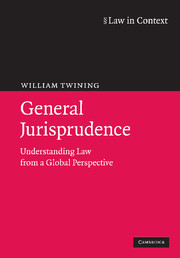Book contents
- Frontmatter
- Contents
- Preface
- Acknowledgements
- List of abbreviations
- Further abbreviations
- Part A
- Part B
- 9 Diffusion of law: A global perspective
- 10 Surface law
- 11 Is law important? Law and the Millennium Development Goals
- 12 The significance of non-state law
- 13 Human rights: Southern voices
- 14 Conclusion
- Bibliography
- Index
10 - Surface law
Published online by Cambridge University Press: 05 June 2012
- Frontmatter
- Contents
- Preface
- Acknowledgements
- List of abbreviations
- Further abbreviations
- Part A
- Part B
- 9 Diffusion of law: A global perspective
- 10 Surface law
- 11 Is law important? Law and the Millennium Development Goals
- 12 The significance of non-state law
- 13 Human rights: Southern voices
- 14 Conclusion
- Bibliography
- Index
Summary
Sophie's problem
Once upon a time Sophie, a student of dispute processes, decided to investigate the handling of disputes in universities. Casual enquiry suggested to her that appointments and promotions of academic staff were a major source of regular and bitter conflicts in academic life. She decided to do a pilot study on the topic in the local university, an institution that broadly followed British patterns of academic governance.
Although her perspective was ethnographic, Sophie decided to start with the formal structure of authority and decision-making in the university. The annual calendar set out the texts of the Charter and Statutes of the University. A regularly updated ‘blue book’ collected the main regulations of the central administration. From these sources she learned that all appointments to academic positions were made by the Governing Body (the Council) on the recommendation of the University Appointments Committee, chaired by the Vice-Chancellor or his deputy. The Committee consisted of twelve regular members and for each appointment just two representatives of the relevant department or subject area. Under the university statutes all ‘permanent’ academic vacancies had to be advertised, with formal applications addressed to the Registrar of the University.
Sophie obtained an interview with the Registrar. Before she saw him she studied all of the formal rules governing appointments that were published in the University's calendar and ‘blue books’. She was sceptical whether these told the whole story. The Registrar outlined the procedures in terms that followed the published rules.
- Type
- Chapter
- Information
- General JurisprudenceUnderstanding Law from a Global Perspective, pp. 293 - 322Publisher: Cambridge University PressPrint publication year: 2009

